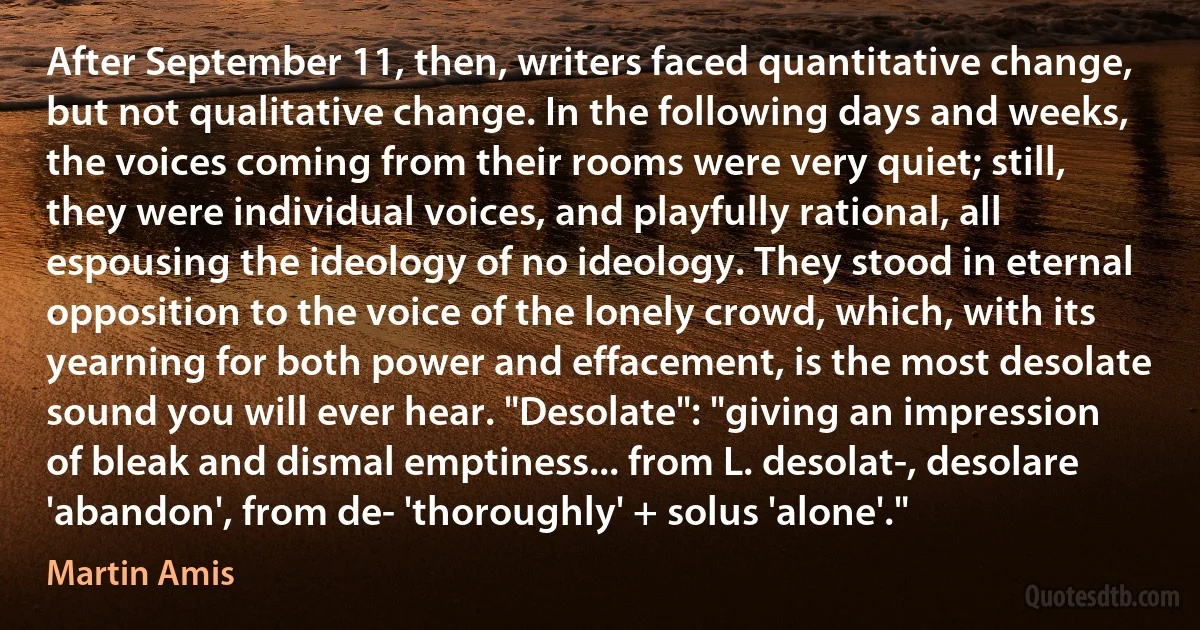
After September 11, then, writers faced quantitative change, but not qualitative change. In the following days and weeks, the voices coming from their rooms were very quiet; still, they were individual voices, and playfully rational, all espousing the ideology of no ideology. They stood in eternal opposition to the voice of the lonely crowd, which, with its yearning for both power and effacement, is the most desolate sound you will ever hear. "Desolate": "giving an impression of bleak and dismal emptiness... from L. desolat-, desolare 'abandon', from de- 'thoroughly' + solus 'alone'."
Martin AmisRelated topics
bleak change coming crowd following giving ideology power qualitative quiet sound stand voice daysRelated quotes
Allen: That's quite a lovely Jackson Pollock, isn't it?
Woman: Yes, it is.
Allen: What does it say to you?
Woman: It restates the negativeness of the universe. The hideous lonely emptiness of existence. Nothingness. The predicament of man forced to live in a barren, godless eternity like a tiny flame flickering in an immense void with nothing but waste, horror, and degradation, forming a useless, bleak straitjacket in a black, absurd cosmos.
Allen: What are you doing Saturday night?
Woman: Committing suicide.
Allen: What about Friday night?

Woody Allen
Though Hitler was indeed racist and anti-Semitic to the core, a man who without compunction could commit murder and genocide, he was also an individual of great courage, a soldier's soldier in the Great War, a political organizer of the first rank, a leader steeped in the history of Europe, who possessed oratorical powers that could awe even those who despised him... Hitler's success was not based on his extraordinary gifts alone. His genius was an intuitive sense of the mushiness, the character flaws, the weakness masquerading as morality that was in the hearts of the statesmen who stood in his path.

Pat Buchanan
There's something in the Western psyche, especially the Western liberal, pluralistic psyche, that finds it impossible to believe that radical ideologues mean what they say. We didn't believe communists or fascists, and in the early days we found it impossible to believe the Khomeinists. Yet these are people who do believe what they say. Attempts to moderate their behavior invariably fail; these are exercises in our heads. We need a policy of strong opposition to the fundamentalists and of strong support for those Muslims who stand up to them.

Charles Krauthammer
Modern man, seeking a middle position in the evaluation of sense impression and thought, can, following Plato, interpret the process of understanding nature as a correspondence, that is, a coming into congruence of pre-existing images of the human psyche with external objects and their behaviour. Modern man, of course, unlike Plato, looks on the pre-existent original images also as not invariable, but as relative to the development of a conscious point of view, so that the word "dialectic" which Plato is fond of using may be applied to the process of development of human knowledge.

Wolfgang Pauli
When will you disembarrass yourselves of the lymphatic ideology of that deplorable Ruskin, which I would like to cover with so much ridicule that you would never forget it? With his morbid dream of primitive and rustic life, with his nostalgia for Homeric cheeses and legendary wool-spinners, with his hatred for the machine, steam power, and electricity, that maniac of antique simplicity is like a man who, after having reached full physical maturity, still wants to sleep in his cradle and feed himself at the breast of his decrepit old nurse in order to recover his thoughtless infancy.

Filippo Tommaso Marinetti
